|
|
|
Sort Order |
|
|
|
Items / Page
|
|
|
|
|
|
|
| Srl | Item |
| 1 |
ID:
138591
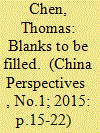

|
|
|
|
|
| Summary/Abstract |
Jia Pingwa’s Decadent Capital was wildly popular upon its publication in 1993. Offering plenty of sex and a bleak view of Chinese society under reform, it was also highly controversial, not least because of the blank squares strewn throughout the text to represent erotic descriptions edited out by the author. Commentators accused Jia of selling out high culture, much like the intellectuals portrayed in the narrative. The novel was banned in 1994 but rereleased in 2009 with one major change: the blank squares were replaced by ellipses. I argue that these blank squares not only make public censorship itself but also constitute the space of alternative publics, whether harking back to an elided past or projecting into a future yet to be written, that the post-Tiananmen Party-state tries to nullify. KEYWORDS: Jia Pingwa, censorship, publishing industry, postsocialism, dystopia, utopia, Tiananmen Square, public, criticism, Lu Xun.
|
|
|
|
|
|
|
|
|
|
|
|
|
|
|
|
| 2 |
ID:
142427
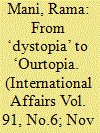

|
|
|
|
|
| Summary/Abstract |
Global governance is in a state of chronic dysfunction. The 70th anniversary of the United Nations offers a timely opportunity to both analyse its disrepair and chart its future through this period of unprecedented upheaval. This article begins with a comparative analysis of two prominent endeavours to redesign global governance in order to address global challenges: the Commission on Global Governance, whose report was launched at the UN's 50th anniversary in 1995; and the Commission on Justice, Security and Governance, which launched its report for the UN's 70th anniversary in June 2015. Despite worthwhile recommendations, both reports suffer from two shortcomings common to such reform efforts. First, pragmatism overrules vision, reducing meaningful global transformation to piecemeal institutional restructuring. Second, the prevailing model of governance, based on nation states and shaped by national interests, remains unquestioned. Such endeavours neither acknowledge nor redress the unfettered pursuit of national interests— geopolitical, economic and military—that caused or failed to prevent today's dystopia of fear and want for most and security for some. The paradigm of global governance needs urgent renewal to equip it to transform this dystopia. This requires two steps. First, looking backwards at the trajectory of philosophical thought on governance and the ideal state, in order to reground global governance in ‘utopian vision’. Second, looking outwards at four unfolding global trends of civics, ethics, physics and metaphysics that are reshaping reality, in order to update global governance to an ‘Ourtopian’ paradigm.
|
|
|
|
|
|
|
|
|
|
|
|
|
|
|
|
| 3 |
ID:
152879
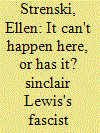

|
|
|
|
|
| Summary/Abstract |
Sinclair Lewis, the first American to win the Nobel Prize in Literature, anticipated many aspects of Donald J. Trump's 2016 campaign and election in his 1935 satirical dystopia, It Can't Happen Here. It was his most popular novel to date and is still satisfying, thought-provoking political theater. Lewis was influenced by growing totalitarianism in Europe, reported on by his second wife, foreign correspondent, Dorothy Thompson. Noting the power of Father Coughlin and Huey Long, among others, to mobilize a public still suffering from the Great Depression, Lewis feared a fascist takeover of the American government by democratic means. Lewis's fictional nightmare features a loutish, ignorant demagogue, who is manipulated by a sinister ghostwriter adviser. With support from a resentful League of Forgotten Men, the demagogue is elected President and quickly establishes a military, racist, and anti-Semitic dictatorship. It Can't Happen Here dramatizes the dire consequences of this takeover, which is not taken seriously at first by Lewis's newspaper editor protagonist, but then is increasingly resisted. Lewis is a social satirist in the Mark Twain tradition, and his novel is worth reading today for its suggestive parallels with current history and its good-hearted humor.
|
|
|
|
|
|
|
|
|
|
|
|
|
|
|
|
| 4 |
ID:
182849
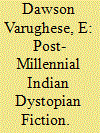

|
|
|
|
|
| Summary/Abstract |
This paper is interested in an emerging canon of post-millennial Indian dystopian fiction in English and the related themes of precarity and (im)purity. After introducing some recent novels and texts from the domestic Indian literary scene, the paper looks to demonstrate how precarity, (im)purity and changing ideas of India(nness) are manifested in Prayaag Akbar’s Leila, a 2017 Indian post-millennial dystopian novel in English. To focus on these particular themes, I consider the novel’s urban geography in terms of its modes of segregation, specifically how the walled sectors of the dystopian, near-future metropolis divide a city ruled over by the Repeaters and pervasive surveillance systems, whilst the Slums and the Outroads lie beyond the city limits. This focus on (im)pure involves an examination of representations of class, privilege, freedom of movement and religious affiliation. Overall, this paper is especially interested in how the dystopian as a narrative mode is harnessed in order to recount ‘precarious’ urban existence, a theme that runs through the wider body of post-millennial Indian dystopian fiction. Through discussion of the (im)purity trope and particularly through the narrative mode of the dystopian, I argue that Leila, like other recent Indian works of this genre, tangentially engages with certain socio-political themes of the second decade of the millennium such as segregation and develops ideas of India(nness) in relation to the Indian post-millennial contemporary.
|
|
|
|
|
|
|
|
|
|
|
|
|
|
|
|
| 5 |
ID:
138593
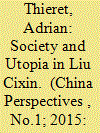

|
|
|
|
|
| Summary/Abstract |
This article examines utopianism in contemporary China through the short stories “Taking Care of God” and “Taking Care of Humans” by best-selling science fiction author Liu Cixin. It argues that these stories constitute an ethical resistance to the shortcomings of the capitalist world order into which China has merged during the reform period. Read as a continuation of the modern Chinese utopian tradition as well as a reaction to contemporary trends, these stories offer an articulation of hope that a more just social order can yet be achieved despite the seemingly intractable problems facing the world today.
|
|
|
|
|
|
|
|
|
|
|
|
|
|
|
|
|
|
|
|
|